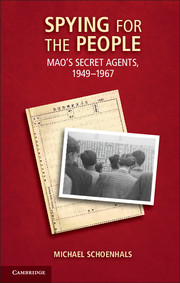Introduction
Published online by Cambridge University Press: 05 January 2013
Summary
On December 1, 1967, a meeting called by PRC Vice-Premier and Minister of Public Security Xie Fuzhi ordered the indefinite suspension of all operational use of agents (teqing renyuan), as well as the decommissioning of safe houses nationwide, and the launch of a general inquiry into whether the men and women who for the past eighteen years had been in China what inoffizielle Mitarbeiter were in East Germany had, in Xie's words, “done any bad stuff” (zuole shenme huaishi). Four and a half decades later, historians still struggle to understand what triggered this drastic course of action. Was it simply how Xie chose to respond to Mao Zedong's Cultural Revolutionary wish to see the “public security, procuratory, and legal sectors beaten to a pulp”? A few months earlier, in July 1967, Xie had specifically tasked his deputies with exploring ways of meeting this stated desire on the part of the CCP Chairman. Or was it prompted – in part or in full – by something completely different, such as a fatal loss of faith, perhaps, in the political integrity of lower-level public security officers and hence in the utility of the agent operations they ran? Or was the reason more simply cold war paranoia?
- Type
- Chapter
- Information
- Spying for the PeopleMao's Secret Agents, 1949–1967, pp. 1 - 14Publisher: Cambridge University PressPrint publication year: 2013



